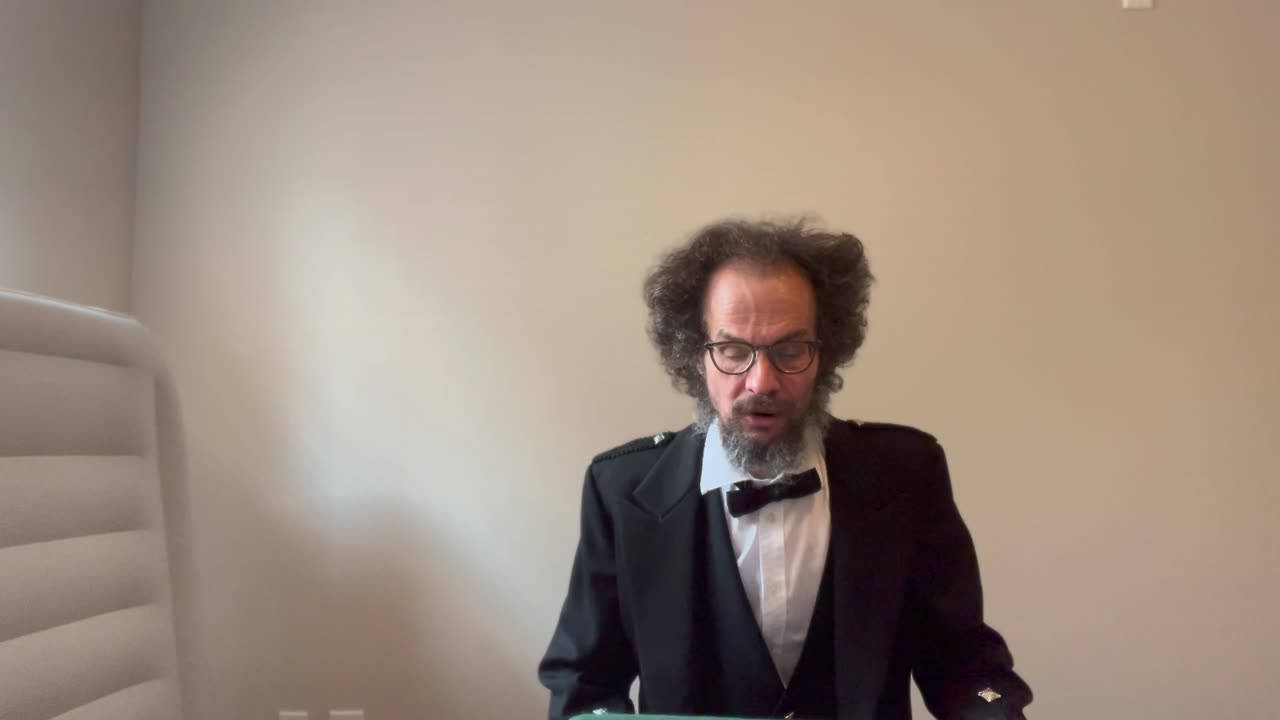Premium Only Content

Crunluath A Mock
Piobaireachd (pronounced “peeb-rook”) is widely considered to be the classical music of the Great Highland Bagpipe, dating back to at least the late 18th century. This skit is a spoof of a piobaireachd competition. In it, the committee submits to its anatomically incorrect illustrated contestants a play list of four piobaireachds to get ready for the contest, one of which will be played in front of the judge. On close inspection (and even on an inspection from a mile away), one comes to the conclusion that while the piobaireachds have different names, “Twinkle Twinkle Wee Starn (“Twinkle Twinkle Little Star”), “The Alphabet Song,” “Baa Baa Ewe Dubh” (“Baa Baa Black Sheep”) and “Och! Shall Ah Tell Ye, Mama,” they’re all essentially the same tune. The ulterior motive comes shining through like a fresh turd on a sprinkler-soaked sidewalk on a sunny morning; the Redundant Variations on a Redundant Theme Invitational Piobaireachd Competition committee is utterly obsessed with this tune, much to the chagrin of our intrepid Mr. MacMickjunior. Only the intervention of a loverly cockney flower girl armed with a hosted bar, a pair of tweezers, and a toy doctorate in Competition Committee Psychiatry can save the day.
Incidentally, “Och! Shall Ah Tell Ye, Mama" is CoBaD’s Scots-English “translation” of the French title “Ah! vous dirai-je, Maman,” which was the original title to the song before “Twinkle Twinkle Little Star,” "The Alphabet Song” and “Baa Baa Black Sheep” butted in and started pushing their respective agendas by changing the lyrics. Apparently the piobaireachd competition committee, upon hearing “Ah! vous dirai-je, Maman,” was under the mistaken impression that because it’s French, it’s about Jacobites (France sheltered many of the Jacobites after their defeat at the Battle of Culloden in 1746).
Despite the strange premise of the skit, “Twinkle Twinkle Little Star” is actually good at illustrating how piobaireachds are structured, specifically when one looks at Wolfgang Amadeus Mozart’s arrangement called “12 Variations ‘Ah, vous dirai-je, Maman’ (K. 265/300e).” In both, you have a theme (or in the case of a piobaireachd, a “ground”), then variations of the theme, each variation becoming more ornamented and elaborate than the previous. In the case of piobaireachds, the variations vary (so to speak), but usually include singlings, doublings, taorluaths (pronounced “taor [rhymes with sour]-loo-uhs”), (perhaps) taorluath a machs, crunluaths (pronounced “krun-lou-uhs”), and (perhaps) crunluath a machs. An approximate timestamp of Rab Latt’s performance gives a very abridged example of a piobaireachd:
1:53 - 2:51 – Ground (in 4/4 time)
2:51 – 2:58 – First four bars (in 6/8 time) of variation 1 (actually a spoof of variation 1 of the piobaireachd “The Desperate Battle”),
3:02 – 3:21 – Last seven and a half bars (in 2/4 time) of the crunluath a mach,
3:21 – 3:45 – First two bars of the ground (again in 4/4 time) to conclude the piobaireachd.
As one can see, the biggest difference between Mozart’s “12 Variations” and the basic piobaireachd is that all piobaireachds end with a restatement of the theme; that is, they end by playing a truncated version of the ground (e.g., the first line only) to “bring us back home.”
For those of you who would like to hear real piobaireachds, CoBaD recommends watching videos from The Glenfiddich Piping Championships. It is relatively easy to find video recordings of past contests online. The Glenfiddich Piping Championships is not as well known outside piping circles as, say, the Clan Viburn International Piano Scale Competition, but it’s definitely worth a listen, make no mistake.
“This hands-free evening of Scottish music is brought to you by Mendelssohn’s Symphony Number 3 in A Minor.” For more on the history of this caption, see the “Abstain Your Enthusiasm” Sketch.
For more on Picasso’s background and how he got into such a frightful state, see the “I’m Gonna Rearrange Your Face” sketch.
-
 1:12:21
1:12:21
TheRyanMcMillanShow
21 hours agoDebbie Lee: Mother of First Navy Seal Killed In Iraq, Marc Lee - RMS 019
161 -
 38:05
38:05
Uncommon Sense In Current Times
13 hours agoIs Israel Being Forced Into a Bad Deal? David Rubin Exposes the Truth | Uncommon Sense
603 -

FreshandFit
8 hours agoAfter Hours w/ Girls
96.6K70 -
 2:33:58
2:33:58
TimcastIRL
11 hours agoDan Bongino ACCEPTS Deputy FBI Director, SECRET NSA CHATS EXPOSED w/Joey Mannarino | Timcast IRL
163K88 -
 1:09:33
1:09:33
Glenn Greenwald
15 hours agoMichael Tracey Reports from CPAC: Exclusive Interviews with Liz Truss, Steve Bannon & More | SYSTEM UPDATE #412
105K88 -
 56:02
56:02
Sarah Westall
11 hours agoBiohacking & Peptides: Weight loss, Anti-Aging & Performance – Myth vs Reality w/ Dr. Diane Kazer
60.6K20 -
 11:22
11:22
Bearing
22 hours ago"Anxious & Confused" Federal Workers FREAK OUT Over DOGE Efficiency Email 💥
83.8K74 -
 1:31:20
1:31:20
Flyover Conservatives
1 day agoUS STOCK MARKET: Sinking Ship - Dr. Kirk Elliott; How I Fought Back Against Woke Schools & Stopped Gender Bathrooms - Stacy Washington | FOC Show
78.6K4 -
 1:08:09
1:08:09
Donald Trump Jr.
16 hours agoFBI Dream Team, Plus Taking Your Questions Live! | Triggered Ep.219
220K287 -
 7:32:37
7:32:37
Akademiks
15 hours agoDrake and PartyNextDoor '$$$4U' Album Sells 250K first week. BIG AK IS BACK.
132K19